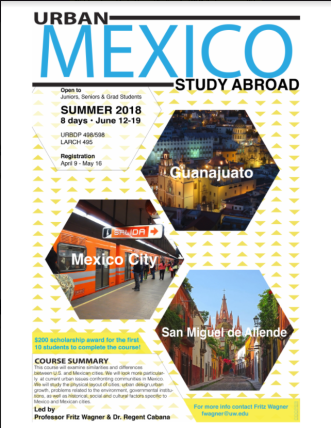Please let your students know about a great opportunity to Study Abroad in Mexico for 8 days this Summer Quarter. The program is from June 12th - 19th, 2018. The class is L ARCH 495A/URBDP 498C/598C Mexico Field Studies in Mexico City, San Miguel de Allende, Guanajuato with Professor Fritz Wagner and Professor Cabana, 3-6 credits. The course could count as I&S, if students need this.
There is a $200 scholarship for the first (10) students that sign up.
Registration starts April 9th, 2018.
Please see attached documents, with schedule, costs, etc.. Any questions, please contact Professor Fritz Wagner, fwagner@uw.edu
Link: 2018 Mexico Program Deatils/Schedule

2018
MEXICO 7 Day SUMMER COURSE----JUNE 12—JUNE 19
YOU WILL LOVE IT—SEE BELOW
LOOKING FOR SOMETHING INTERESTING, FUN AND EDUCATIONAL?
How about an 7 day trip to MEXICO
SUMMER 2018
LArc 495 and URBDP 498 C for juniors/seniors, and URBDP 598 C for grad students. Both 3-6 variable credit.
2018 JUNE 12—JUNE 19
COMPARATIVE
URBAN PLANNING, DESIGN AND RELATED URBAN ISSUES:
MEXICO AND THE US
The course is open to juniors and seniors as well as graduate students. Professor Fritz Wagner and Dr. Regent Cabana will lead it. We will visit three Mexican cities-Mexico City, San Miguel de Allende and Guanajuato - where a number of professors, government officials and other urban experts will give lectures and tours.
The course will examine similarities and differences between U.S. and Mexican cities. We will look more particularly at current urban issues confronting communities in Mexico. We will study the physical layout of cities, urban design, urban growth, problems related to the environment, governmental institutions as well as historical, social and cultural factors specific to Mexico and Mexican cities. Students will write a paper on a topic related to an issue encountered in Mexico.
A FANTASTIC TRIP AND LOTS TO LEARN-YOU WILL NOT BE DISAPPOINTED
Our estimated cost of the trip (airfare, meals, ground travel, and accommodation) is $1,200, not including tuition
Students pay own travel to and from Mexico and pay for own lodging and meals and ground transport. Suggested flight times will be offered and accommodations will be organized by instructors.
Syllabus
Comparative research in urban studies has been a major development in the last decade but little has been done to provide US students with a comprehensive knowledge of Mexican cities and how they compare with US cities. The aim of the course is to introduce US students to theoretical and methodological aspects of comparative urban research by providing on-site case studies of Mexican cities.
The course will be open to juniors and seniors as well as graduate students for three or six hours credits. The 6 credit option requires a longer paper. We will visit three Mexican cities – Mexico City, San Miguel de Allende, and Guanajuato - where a number of professors, government officials and other urban experts will give lectures and tours. The course will examine similarities and differences between U.S. and Mexican cities. We will look more particularly at current urban issues confronting communities in Mexico. We will study the physical layout of cities, urban design, urban growth, problems related to the environment, governmental institutions as well as historical, social and cultural factors specific to Mexican cities. Students will write a comparative paper on a topic related to urban issues encountered in Mexico and keep a daily journal.
The course introduces the logic of comparative research in the social sciences and applies its theory and methodology to the study of Mexican cities as compared to US cities. Its multidisciplinary and comparative character develops the ability to interpret and understand urban changes, changing demographics, and to analyze appropriate and sustainable strategies and policies to address urban problems in Mexico and the US. Students will gain an understanding of economic, political, social, and cultural differences between Mexico and the US. It will also help them better understand the diversity of the contemporary urban world in Mexico and the US and the importance of the social-cultural factors specific to each region and city in finding solutions to common urban problems. By the end of the course, students are expected to be conversant in cross-border urban issues in Mexico and the US.
For further info. contact Prof. Wagner 206-351-6749 or fwagner @uw.edu
Space is Limited so get organized soon